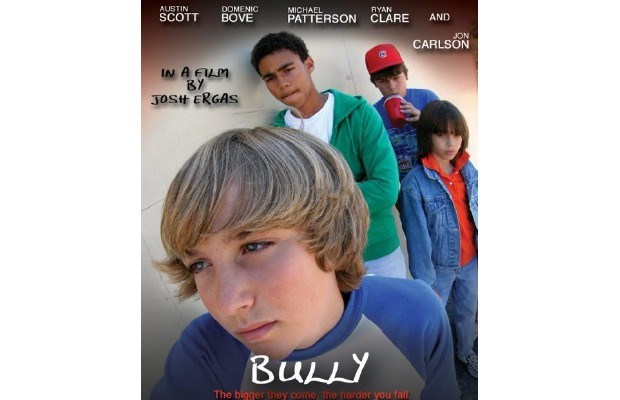If the American healthcare system, mounting military debt and the lunacy of the never-ending Republican race weren't enough to remind you how lucky you are to be Canadian, here's another reason.
It's a reminder of how much more tolerant we tend to be than our neighbours to the south over film classification.
Three weeks after the Motion Picture Association of America slapped Bully, Lee Hirsch's graphic antibullying documentary, with an R rating for coarse language, Consumer Protection B.C.'s film classifier granted it a PG rating.
Film classification boards in Ontario, Alberta, Manitoba and Saskatchewan have since followed suit.
Unlike the MPAA rating that prohibits filmgoers under 17 unless accompanied by a parent or guardian, the B.C. rating advises parental guidance, with a "coarse language, theme of bullying" advisory, but no age restriction.
Famously combative movie mogul Harvey Weinstein went ballistic - imagine that! - over the MPAA's restrictive rating of his disturbing documentary about the bullying epidemic in U.S. schools.
It's exposed through the eyes of five victims, some shown being swarmed and assaulted, and their families.
A few too many F-bombs landed Bully the R-rating stateside and sparked a grassroots backlash.
It's ironic that this legendary hothead who has earned a reputation as a Hollywood bully himself, would champion such a film. Indeed, a mellowing Weinstein has said protesting the MPAA rating has been a "redemptive" act.
His Weinstein Co., the film's U.S. distributor, appealed the decision.
The MPAA declined to lower the rating to PG-13, however, despite a plea from Katy Butler, a bullied Michigan teenage activist who collected nearly 300,000 signatures - including from entertainer Ellen DeGeneres and members of Congress - through an online petition.
Weinstein went so far as to threaten to withdraw from the MPAA rating system - prompting National Association of Theatre Owners president John Fithian to warn him exhibitors could regard his unrated films as NC-17, the kiss of death.
While such over-the-top shenanigans suggest Weinstein is exploiting the controversy for free publicity, I have to concur with his contention that the R rating restricts the audience that stands to benefit most from it.
Let's get real: Having to see Bully with your parents is the last thing most teenagers want.
And how's this for irony? "I can't see my own life," lamented Alex Libby, 15, one of its bullied subjects.
In the wake of this controversy, you might think Steven Pelton, Consumer Protection B.C.'s director of motion pictures, would be under additional pressure to give Bully a more reasonable rating before it opens here next month.
"Not at all," says Pelton. "We try to stay informed about high-profile films, but controversy in other jurisdictions don't have any impact on us. We're in a unique position. Our categories are defined in the legislation under the Motion Picture Act, so we remain objective and utilize those categories without being influenced."
In the case of Bully, some instances of coarse language, violence and the bullying theme were noted.
"It fell well within the confines of the PG category," he said. "It was a very straightforward decision."
Alliance Films, the Canadian distributor, noted appreciatively that the B.C. rating "reinforces the movie's message that must be urgently addressed with great care and consideration." And the director gave it a thumbs-up.
"I'm thrilled that kids of all ages can now join their parents, teachers, socialwork advocates and leaders to bring about change for this deeply important cause," Hirsch said in a statement.
While MPAA ratings have no bearing on his decisions, Pelton still has to dispel confusion.
"A key challenge is that people in B.C. are inundated with ads on TV and news about the MPAA ratings, but we have a completely different system," he said.
"And it's not unusual for us to go PG when they go Restricted."
Pelton urges filmgoers to contact Consumer Protection B.C. if they have concerns, and to visit its website for more details.
"We try to mirror the collective community standards of B.C.," he added.
While B.C.'s Motion Picture Act lets distributors challenge classifications through a "reconsideration request," Consumer Protection B.C. doesn't censor films shown in theatres.
In the U.S., where MPAA participation is voluntary, dissatisfied filmmakers have various choices. A film can be released unrated, or elements deemed offensive can be cut to achieve a lower rating.
It's easy to see why Hirsch has rejected what amounts to censorship.
Removing the expletives would lessen the impact of the film's harsh realism. It would be like releasing Goodfellas or The Big Lebowski without the profanity that defines them.
Stranger things have happened. Take Weinstein's classic feud with MPAA when his Oscar-winning The King's Speech was rated R because of a scene where the British monarch drops several F-bombs during speech therapy.
To reach a wider audience, some were muted for a PG-13 version.
Only in Hollywood.
View the Trailer for Lee Hirschs documentary Bully
mreid@timescolonist.com
On the web: filmratingsbc.ca



